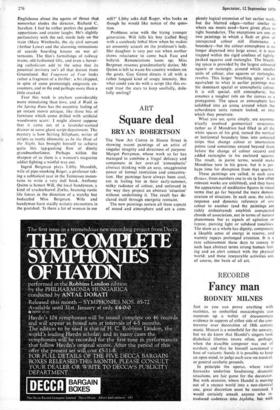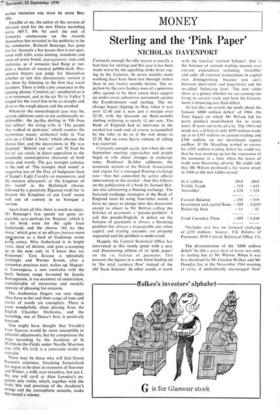RECORDS
Fancy man
RODNEY MILNES
Just as you can prove anything with statistics, so embattled musicologists can summon up a welter of documentary evidence in support of either side of the con- troversy over decoration of 18th century music. Mozart is a minefield for the unwary, but we do know that Handers singers took diabolical liberties (more often, perhaps, when the irascible composer was out of earshot), and that he himself sanctioned a host of variants. Surely it is possible to keep an open mind, to judge each case on musical, or general aesthetic grounds.
In principle the operas, where vocal fireworks underline headstrong dramatic situations, are fair game for the decorator. But with oratorio, where Handel is moving out of a rococo world into a neo-classical one, great discretion must be exercised. I would certainly assault anyone who in- troduced cadenzas into Jephtha, but with earlier oratorios one must be more flex- ible.
flexible or no, the editor of the version of Messiah used for the new Decca recording
(SETA 465-7, 89s 9d until the end of January), anonymous on the records themselves but revealed in the publicity to be the conductor, Richard Bonynge, has gone too far. Scarcely a bar passes that is not spat- tered with trills, extra dotting, mordents and turns of every breed, appoggiature, runs and cadenzas, as if someone had flung at ran- dom a bucket of musical pebble-dash. Pro- spective buyers can judge for themselves whether or not this idiosyncratic version is for them by listening to the first two vocal numbers. There is little calm assurance in the opening phrase 'Comfort ye', smothered as it is in ornament, and in the air 'Ev'ry Valley' I longed for the vocal line to be as straight and plain as the rough places and the crooked.
Whatever the musicological case may be, certain additions seem to me aesthetically in- defensible: the jig-like dotting in 'Oh thou that tellest'; the string trills in 'The people that walked in darkness,' which counter the mysterious music; orchestral trills in 'For unto us a Child is born,' which obscure the chorus line; and the decorations in 'He was despised,' Behold and see' and 'If God be for us' are surely in direct opposition to the essentially contemplative character of both music and words. The gay trumpet cadenza at the end of 'The trumpet shall sound' is suggestive less of the Day of Judgment than of Suppes Light Cavalry on manoeuvre, and the massive allargando at 'the kingdom of this world' in the Hallelujah chorus,
followed by a positively Elgarian swell for 'is become the Kingdom of our Lord' seems well out of context in so baroque a version.
Apart from all this, there is much to enjoy. Mr Bonynge's fast speeds are quite ac- ceptable, save perhaps for 'Rejoice,' which is a bit brisk even for the agile Joan Sutherland, and the chorus 'All we like sheep,' which goes at an allegro furioso more apprpriate to a herd of Gadarene swine going astray. Miss Sutherland is in bright voice, clear of diction, and goes a-scooping up to the note only in 'I know that my Redeemer.' Tom Krause is splendidly forthright and Werner Krenn, after a somewhat precious start, wakes up. Huguet- te Tourangeau, a new contralto with the beefy bottom range favoured by Scuola Bonyngiensis, is too eccentric of enunciation, unpredictable of intonation and smokily operatic of phrasing for oratorio.
The Ambrosian Singers are very nippy (they have to be) and their range of tone and
clarity of words are exemplary. There is some wonderfully clean playing from the English Chamber Orchestra, and the recording, one of Decca's best, is positively buoyant.
You might have thought that Vivaldi's Four Seasons would be more susceptible to editorial adjustments, but by comparison the Argo recording by the Academy of St Martin-in-the-Fields under Neville Marriner (zac 654, 45s 11d) is a consistent model of restraint.
There may be those who will find Simon Preston's continuo, forsaking harpsichord for organ as he does in moments of Summer and Winter, a trifle over-inventive, but not I. No one will cavil at Alan Loveday's ex- quisite solo violin, which, together with the lively bite and precision of the Academy's strings and the atmospheric acoustic, make this record a winner.















































 Previous page
Previous page